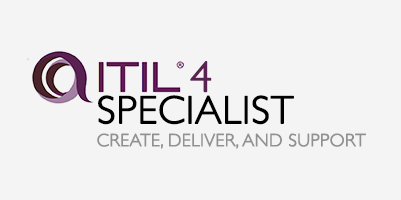Course Overview
The ITIL® 4 Specialist Create, Deliver, and Support course is a vital component of the ITIL 4 certification journey, focusing on the amalgamation of diverse value streams and activities essential for crafting, delivering, and supporting IT-enabled products and services. Tailored for IT service management professionals, this course empowers learners with the expertise to cultivate a conducive team environment, refine organizational frameworks, and instill a culture of continuous improvement to elevate service standards and operational efficiency. Participants will explore the nuances of integrating information technology, leveraging advanced analytics, robotic process automation, and AI to streamline service creation and support processes. Additionally, the course delves into value stream design and mapping, adopting a shift-left approach to prioritize work, and evaluating commercial and sourcing models to optimize service delivery. Upon completion, individuals will possess a deep understanding of sophisticated service management methodologies pivotal for driving customer satisfaction and achieving business objectives.
Schedule Dates
ITIL® 4 Specialist Create, Deliver and Support
ITIL® 4 Specialist Create, Deliver and Support
ITIL® 4 Specialist Create, Deliver and Support
ITIL® 4 Specialist Create, Deliver and Support
Course Content
- Organisational Structures
- Employee Satisfaction
- Building Effective Teams – Roles and Competencies
- Professional IT and Service Management Skills and Competencies
- Generalist or ‘T-shaped’ Models
- Developing a Broad Set of Competencies
- Developing Team Culture – What is Team Culture?
- What does Cultural Fit Mean and Why is it so Important?
- How to Develop and Nurture Good Team Culture?
- A Continual Improvement Culture
- A Collaborative Culture
- Align with the Type of Work
- Learn Through Collaboration
- Servant Leadership
- Customer Orientation: Putting the Customer First
- Customer Experience
- Positive Communication
- Shift-Left Approach
- Building a Shift-Left Approach
- Workforce Planning and management
- Results-Based Approach
- Challenges
- Integration and Data Sharing
- Integration Topologies
- Integration Approaches
- Reporting and Advanced Analytics
- Data Analytics
- Big Data
- Collaboration and Workflow
- Tools and Capabilities
- Robotic Process Automation
- RPA Technologies
- Artificial Intelligence
- Application and value
- Machine Learning
- Supervised Learning
- Benefits and Limitations of Machine Learning
- Continuous Integration, Continuous Delivery, and Continuous Deployment (CI/CD)
- Goals and Value Measurement
- CI/CD Pipeline
- Aligning CI/CD with ITIL®
- How Would ITIL Deploy a Change?
- CI/CD Does Not Suit Every Situation
- Value of an Effective Information Model
- Anatomy of an Information Model
- Integrated Service Management Toolsets
- Service Management Toolset Expectations
- Value Streams to Create, Deliver, and Support Services
- ITIL® Service Value Streams
- Structure of an ITIL® Service Value Stream
- Value Streams and Organisations
- Design Thinking
- Designing a Service Value Stream
- Describing a Step of a Value Stream
- Value Stream Mapping
- Key Metrics When Analysing a Value Stream
- Process Timing
- Simple Representation of a Value Stream
- Complex Representation of a Value Stream
- Model Value Streams for Creation, Delivery, and Support
- Development of a New Service
- Design Considerations
- Demand to Value
- Development of a New Service
- tep 1: Acknowledge and Document the Service Requirements
- Step 2: Decide Whether to Invest in the New Service
- Step 3: Design and Architect the New Service to Meet Customer Requirements
- Step 4: Build, Configure, or Buy Service Components
- Step 5: Deploy Service Components in Preparation for Launch
- Step 6: Deliver and Support Within the Service Value Chain
- Service Design
- Software Development and Management
- Deployment Management
- Release Management
- Service Validation and Testing
- Change Enablement
- Restoration of a Live Service
- Design Considerations
- Demand and Value
- Journey from Demand to Value
- Restoration of a Live Service
- Step 1: Acknowledge and Register the User Query
- Step 2: Investigate the Query, reclassify it as an Incident, and Attempt to Fix it
- Step 3: Obtain a Fix from the specialist team
- Step 4: Deploy the Fix
- Step 5: Verify that the Incident has been Resolved
- Step 6: Request Feedback from the User
- Step 7: Identify Opportunities to Improve the Overall System
- Service Desk
- Incident Management
- Problem Management
- Knowledge Management
- Service Level Management
- Monitoring and Event Management
- Why do we need to Prioritise Work?
- Managing Work as Tickets
- Prioritisation and Demand Management
- How to Prioritise Work?
- WSJF (Priority)
- Swarming
- Commercial and Sourcing Considerations
- ‘Build or Buy’ Considerations
- Commodification
- Defining Requirements for Service Components
- Selecting a Suitable Vendor
- Sourcing Options and Models
- Outsourcing Considerations
- Service Integration and Management
FAQs
The ITIL® 4 Specialist Create, Deliver, and Support course is an integral part of the ITIL 4 certification path, focusing on integrating various value streams and activities to effectively create, deliver, and support IT-enabled products and services.
This course is designed for IT service management practitioners, including IT managers, service delivery managers, service desk managers, and anyone involved in creating, delivering, or supporting IT services.
The course covers a wide range of topics including fostering effective team culture, improving organizational structures, implementing continuous improvement practices, integrating advanced analytics, robotic process automation, and AI, designing and mapping value streams, prioritizing work using a shift-left approach, and optimizing service delivery through commercial and sourcing models.
The course may be delivered through instructor-led training sessions, hands-on workshops, case studies, and interactive discussions. Depending on the provider, it may be offered in person, virtually, or through self-paced online modules.
Completing this course equips individuals with advanced skills and knowledge essential for effectively managing and optimizing IT-enabled products and services. It enhances career prospects, improves job performance, and contributes to organizational success.
Yes, the certification is globally recognized and demonstrates proficiency in IT service management practices aligned with ITIL 4 principles.

 4.9
4.9




